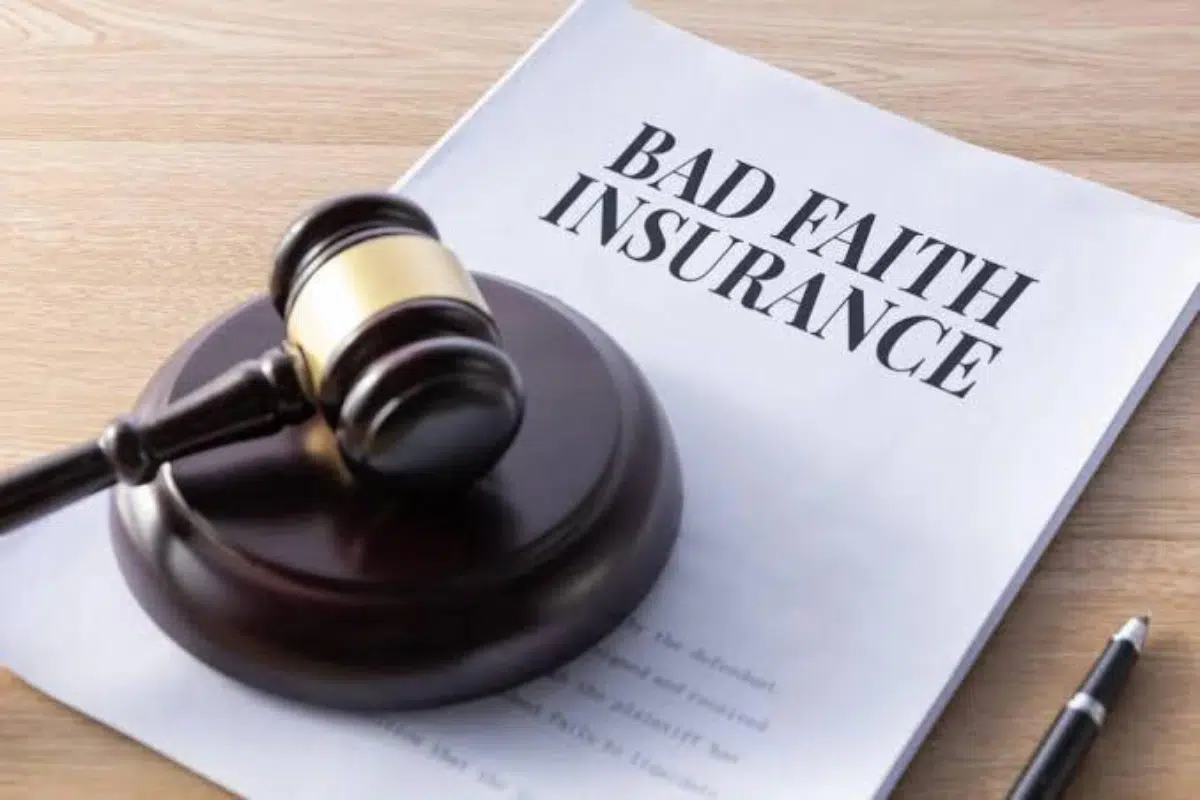
Insurance policies are safety nets that are supposed to protect you from the worst that life can throw at you. In exchange for either a one-time or regular payment, the insurance company agrees to compensate you if you suffer financial losses in specific circumstances. This is a legal contract between you and the insurance company.
If the circumstances arise where you should receive compensation, you expect the insurance company to deal fairly and swiftly provide it. However, that doesn’t always happen.
Sometimes, an insurance company will act in bad faith to avoid paying its contractual obligations. When this happens, you need a bad-faith insurance lawyer to help file a lawsuit against your insurance provider.
Bad Faith Insurance Claims
Insurance companies are businesses. These businesses make money by receiving insurance premiums from clients. They have many of the usual expenses of most businesses that don’t change much from year to year, like employee salaries. However, they also have one expense that can be highly variable.
The amount of profit that an insurer makes is primarily based on how much it pays out against policy claims. The more the insurance company pays, the less profit it makes. This gives it a financial incentive to act in bad faith.
Bad faith claims are on the rise in the United States. This means that if you need to file an insurance claim, you may not receive a fair settlement. If you suspect your insurance company acted in bad faith, contact an attorney right away. The following are common insurance company tactics that constitute bad faith.
Denial of Valid Claims
Insurance law allows the insurance provider to design and implement the insurance process. This gives the insurance company almost complete control over whether your claim is approved or denied. When insurers deny claims, they need to provide a detailed explanation. If that explanation isn’t true or doesn’t comply with state law, the insurer acted in bad faith.
Failure to Act in a Timely Manner
Insurance companies are aware that the longer it takes for them to act on a claim, the more likely it is that the claimant will drop it or will accept a lesser settlement. While it is not legal for the insurance company to unreasonably delay your claim, it can be hard to prove that it is acting in bad faith.
Insurance providers might claim that unreasonable delays are due to taking the time to complete a proper investigation or because the claimant needs to provide additional information. These claims can be difficult to prove insincere.
Undervaluing an Insurance Claim
Typically, the insurance company understands its legal obligations better than the claimant. This opens the claimant up to bad faith tactics.
An insurer might offer a settlement that is a fraction of the true value of your losses or expenses, even though it is aware that it should be paying more. It may even try to legally justify this by claiming that you never provided it with evidence of the value of your claim. This may sound like a reasonable explanation, but often it is not made in good faith.
Misrepresentation of an Insurance Policy
Just as the insurance company understands the system better than you do, it also better understands the terms of the insurance policy that you both signed. One way that an insurance company can act in bad faith is by misrepresenting the details of that insurance policy.
If you believe your policy offers different benefits than it does, you might not file an insurance claim or might ask for less compensation than you are due. These bad faith practices may go unnoticed through multiple insurance claims if you don’t realize that the insurance company’s actions are dishonest.
Establishing Bad Faith in an Insurance Claim
An experienced personal injury lawyer knows how to prove bad faith insurance claims in these situations. If you believe your insurance company is engaging in bad faith tactics, you should contact bad faith insurance lawyers at our law firm as soon as possible to establish that the insurance provider is not acting in good faith.
Our legal professionals will attempt to hold the insurer accountable by establishing bad faith conduct. When trying to prove that an insurer acted in bad faith, we need to prove the following elements.
The Insurer Was Contractually Obligated to Perform Specific Actions
This means that our legal professionals will scour your insurance policies to understand exactly what legal obligations the insurance company had toward you. Fair dealing requires the insurer to follow those contractual obligations to the letter.
The Insurance Provider Violated One or More of Those Obligations
Next, we need to prove that your insurance company violated at least one of those obligations. That means we need to determine exactly what it did and whether any of those actions fall within the letter of the contract. We also look at whether any actions by the insurer violate the spirit of the contract, because that may be evidence of deception.
The Insurance Company Knew It Was Violating an Obligation
Just because an insurer denied your claim, violating the terms of your contract, that doesn’t necessarily constitute bad faith. To act in bad faith, the insurer needs to be aware that it is violating the contract.
Sometimes, insurance companies just make mistakes. And if an insurance company acts in good faith to immediately correct a mistake, you probably do not have grounds for a bad faith lawsuit. When caught, many insurers will act like it was a mistake all along and offer to correct the error. This is an act of bad faith that is difficult to prove.
You Suffered a Loss of Financial Resources Due to These Violations of the Insurance Policy
Finally, we need to prove that the insurer’s actions caused you financial harm. This usually just means that we need to show a disparity between the amount of compensation you should have received and the amount you did receive. That disparity reflects financial losses that you endured.
Gathering Evidence for Your Case
Gathering evidence for a bad faith insurance claim is essential to its success. In a bad faith insurance case, we will gather as much evidence as possible of the four elements we need to prove.
It is important to preserve as much documentation as possible. Any paperwork you get from the insurance company should be turned over to our legal professionals. The same is true for any electronic documents.
If you make phone calls to the insurance company, try to record the times and days of those calls. Nearly all insurance companies record phone calls, which means we can petition the courts to obtain a copy of the recording.
It is just as important to preserve detailed records of all expenses that you incurred related to the insurable incident. If you were seriously injured, this will include medical records and hospital bills. The only way we can prove that the insurance company didn’t give you fair compensation is by proving how much compensation you should have received from a valid claim.
Typically, it will take at least several weeks to gather sufficient evidence for a bad faith claim and may take months or years, depending on the actions of the insurer. While we prefer to file an insurance bad faith claim as soon as possible, Florida law allows us to wait up to two years to file a lawsuit. If it takes that long to get enough evidence, then it is best to use the time granted by state law.
Once we believe we have enough evidence to prove bad faith by your insurance provider, we will move forward with your case. Typically, this involves taking legal action by filing a lawsuit with the Florida state courts. However, we might pursue settlement negotiations before filing a lawsuit in some situations.
The more evidence we have collected, the more likely that an insurer will agree to a negotiated settlement without the need to involve the courts. This is preferable when possible because it gets you compensation more quickly and ensures that you get a specific amount.
Any evidence that can be used during settlement negotiations is also valuable at trial. If we need to pursue your case in the courtroom, we will use this evidence to try to convince a jury to side with your claim and award you reasonable damages.
When to Seek Legal Help for a Bad Faith Insurance Claim
The best time to seek legal counsel to help you with a bad faith claim is as soon as possible after you are the victim of bad faith. The sooner we get a hold of your case, the easier it may be for our legal team to prove the insurance company acted unreasonably.
At Kennon Law, we offer a free consultation for anyone who believes they have a valid reason to file a bad faith claim against their insurance carriers. During that free consultation, we will do our best to determine whether the insurance provider acted in bad faith and whether you have a strong enough case to pursue.
If you decide to work with us, our legal team will promptly collect as much evidence as possible. In bad-faith insurance claims, evidence can disappear quickly. Witnesses may become forgetful if they are not promptly interviewed.
Even worse, insurance adjusters might be pressured into giving false testimony by an insurance company. The earlier we talk to them, the more likely we are to get a true statement.
Moving swiftly also helps you get a favorable outcome from our legal services. If you are filing a bad faith claim, you have already waited longer than you should to get a reasonable amount of compensation on your original claim.
During that time, bills were coming in while you were missing work. Every day you need to wait could be financially devastating.
Finding the Right Lawyer for Your Bad Faith Insurance Case
Why should you trust the attorneys at Kennon Law to handle your bad faith insurance claim? Our law firm has extensive experience handling personal injury cases in Florida. We have more than three decades of experience in and out of the courtroom.
At Kennon Law, we believe that everyone who has been wrongfully denied compensation deserves to receive justice from the courts. When we take a bad faith insurance claim, we fight relentlessly to get you as much compensation as the law allows.
We also believe that an informed client is an empowered client. Starting with your initial consultation, where we will discuss how to prove bad faith insurance claims and what strategy is likely to be best for your case, we will ensure that you understand everything about the legal process.
This approach to bad faith claims has proven highly successful. Our law firm has obtained millions of dollars for our clients over the years. If you believe an insurer didn’t handle your claim properly, contact our law firm right away to talk to lawyers who will help you fight the bad faith tactics of your insurance company.
Discuss How to Prove Bad Faith Insurance Claims With an Experienced Personal Injury Attorney Today
Were you or a loved one denied reasonable compensation from an insurance claim without a valid reason? When an insurance company denies your claim without proper cause or otherwise doesn’t engage in fair dealing, the law allows you to file a bad faith claim against your insurer.
At Kennon Law, our attorneys have been helping victims of bad faith get compensation for those unfair actions for decades. Our legal associates are ready to aggressively represent you throughout the legal process.
Don’t let an insurance company get away with denying you fair compensation by violating a contract that you entered into in good faith. Contact our law firm immediately if you suspect that your insurer acted in bad faith during the claims process to schedule a free consultation with one of our experienced bad faith claim attorneys.


